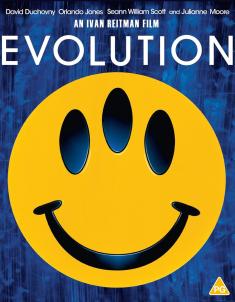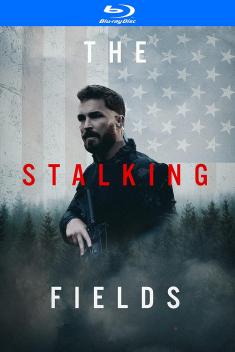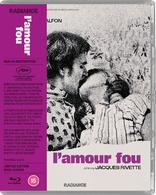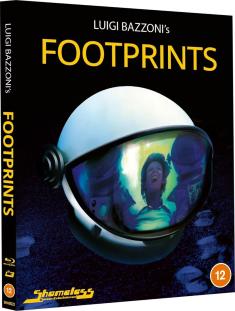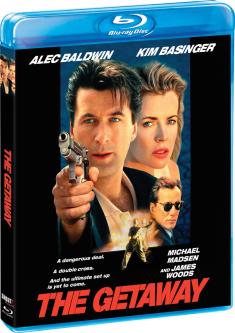The Magnificent Ambersons - Criterion Collection
Overview -
Despite its reputation as one of Hollywood’s great casualties, The Magnificent Ambersons remains a noteworthy cinematic achievement. Writer-director Orson Welles’s ambitious, atmospheric adaptation of Booth Tarkington’s tale of a lofty family’s systematic decline fell victim to ruthless cutting and studio-mandated alterations that forever changed its tone and structure, but thankfully much of its brilliance survives. Dazzling moments and memorable performances distinguish the film, which Criterion beautifully honors with a brand new video transfer, excellent audio, and a massive supplemental package. This is the definitive home video release of a film that deserved far more respect than it initially received, and it comes highly recommended.
Orson Welles’s beautiful, nostalgia-suffused second feature—the subject of one of cinema’s greatest missing-footage tragedies—harks back to turn-of-the-twentieth-century Indianapolis, chronicling the inexorable decline of the fortunes of an affluent family. Adapted from an acclaimed Booth Tarkington novel and characterized by restlessly inventive camera work and powerful performances from a cast including Joseph Cotten, Tim Holt, and Agnes Moorehead, the film traces the rifts deepening within the Amberson clan—at the same time as the forces of progress begin to transform the city they once ruled. Though RKO excised over forty minutes of footage, now lost to history, and added an incongruously upbeat ending, The Magnificent Ambersons is an emotionally rich family saga and a masterful elegy for a bygone chapter of American life.
Storyline: Our Reviewer's Take
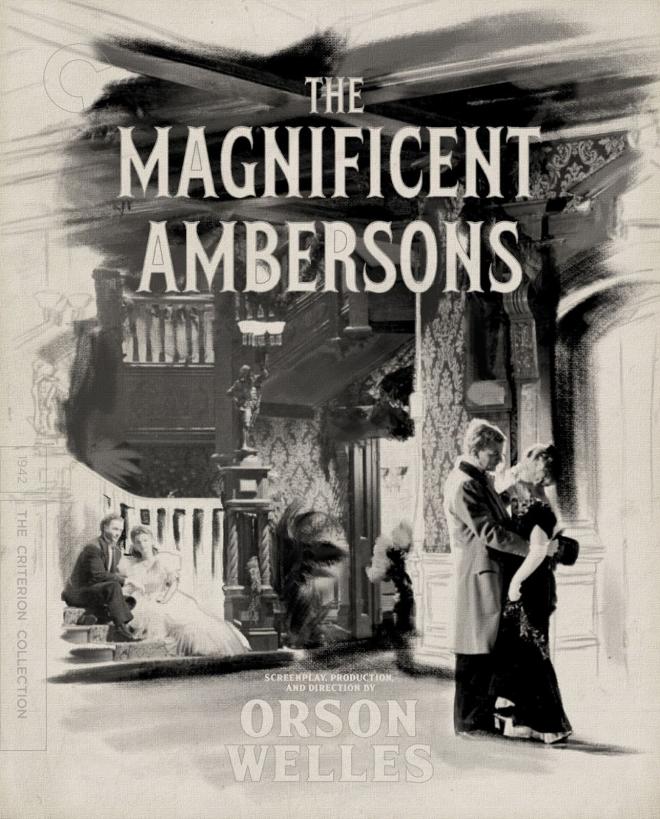
What if? If only... Such thoughts haunt countless film buffs who’ve seen The Magnificent Ambersons, know its unfortunate history, and yearn for what might have - and should have - been. Like other butchered classics (Erich von Stroheim’s Greed and the 1954 version of A Star Is Born spring immediately to mind), writer-director Orson Welles’s adaptation of Booth Tarkington’s novel is choppy and disjointed, a jumble of breathtaking pieces in search of a cohesive whole. It’s also the victim of studio politics and an industry more concerned with its bottom line than producing cinematic art. And yet amazingly, despite its shabby treatment and the hodgepodge of styles that now comprise it, The Magnificent Ambersons is still a fascinating, engrossing, moving, and often visually arresting movie. (Even after its hatchet job, it earned a well-deserved Best Picture Oscar nomination.) One can only imagine, though, how much greater this melancholy chronicle of a wealthy Midwestern family’s slow and steady decline might have been had Welles’s original vision remained intact.
Sadly, that vision, which reportedly exuded grace, elegance, artistry, and more than a little despair, went over like a lead balloon at the film’s first preview. The barrage of negative comment cards shocked RKO studio executives, who feared Welles’s prestigious follow-up to Citizen Kane would never recoup its astronomical costs. Panic quickly set in, and before cooler heads could prevail, RKO demanded The Magnificent Ambersons be substantially trimmed and restructured to satisfy the whims of wartime audiences still reeling from the recent Japanese attack on Pearl Harbor. Contemporary viewers craved lighter, more optimistic fare, and RKO - much to the everlasting regret of many a movie maven - vowed to give them just that.
Welles easily could have made the mandated changes, but as bad luck would have it, he left the country at the U.S. government’s behest right after he completed Ambersons to shoot a movie about Brazil (which he never finished) to aid the Allied cause. So the thankless task of “fixing” The Magnificent Ambersons fell to editor Robert Wise, who two decades later would direct a couple of very famous Oscar-winning musicals, West Side Story and The Sound of Music. Following RKO’s edict, Wise excised major scenes, reordered others, and shot new material, including an incongruous happy ending. In all, he cut about 50 minutes of Welles’s footage, reducing a 131-minute film to a mere 88 minutes and turning what might have been a masterpiece into what some would call a mess. Adding insult to injury, RKO destroyed all the deleted footage, just to make sure Welles couldn’t get his hands on it and monkey with the movie in the future. That final act of betrayal devastated the director, who spent the rest of his professional life trying to overcome the pain The Magnificent Ambersons inflicted upon him.
The production’s woeful history ironically rivals the Amberson’s woeful deterioration, producing a one-two punch that’s tough to take. While watching the movie, you feel sorry for both the family and the film, so when it’s all over it’s hard not to feel doubly depressed. The news, though, isn’t all bad. Yes, some plot holes and development gaps plague the picture, and some nuance surely has been lost, but the emotional and thematic power of The Magnificent Ambersons is so potent, it plows through any structural or artistic obstacles. Welles incisively juxtaposes the Ambersons’ decline against the rise of the automobile, which spurred metropolitan growth and industrialization while slowly bleeding dry the idle rich, who lived on inherited wealth and lofty reputations until their accounts cratered. Like many Gilded Age families, the smug Ambersons thumb their nose at the evolving world and stubbornly cling to an outmoded way of life, and ruin is their sad reward.
In the late 1800s, teenage beauty Isabel Amberson (Dolores Costello) rejects the attentions of dashing inventor Eugene Morgan (Joseph Cotten) in favor of a more suitable match. Isabel marries and so does Eugene, and their paths don’t cross again until many years later when both have one grown child whom they singularly adore. The offspring, though, are polar opposites. Isabel’s son George (Tim Holt) is a spoiled, selfish, arrogant prig, whose stuffy superiority and insufferable sense of entitlement breed almost universal contempt, while Eugene’s daughter Lucy (Anne Baxter) is sweet, charming, and devoid of affectation. The two meet at the Amberson Christmas ball and a mutual attraction develops, just as old sparks reignite between Isabel and Eugene, who is now a widower and beginning to achieve a modicum of success as an automobile pioneer.
As the Morgans ascend, the Ambersons begin their decline. Bad investments by Isabel’s husband threaten the stability of the Amberson estate, and the resulting stress leads to his death. Not long after, Isabel and Eugene rekindle their romance, which a jealous George tries to thwart. Yet with money drying up and the fast-and-furious automobile age quickly transforming society, commerce, and urban landscapes, only love can save the once magnificent Ambersons, who tragically can’t manage affairs of the heart any better than their financial affairs.
The Magnificent Ambersons is a tale of progress and inertia, of wealth and bankruptcy, of denial and affirmation, of foolish pride and unfulfilled longings. It’s both dreamily nostalgic and devastatingly real, and Welles beautifully balances the two moods. The film extols the beauty of a bygone era and champions American ingenuity all while bemoaning the speed of change and the physical and emotional ravages it exacts on the characters. Amid these broad themes, Welles’s adaptation also addresses the insidious nature of idle gossip and latent Oedipal relationship between George and Isabel. Welles weaves these textures and tones into a rich tapestry, and when he’s given free rein to tell his story, he produces some stunning imagery, too.
The opulent, four-walled, three-story sets immerse us in the grand Amberson world (they reportedly cost more than all the sets in Gone with the Wind) and provide Welles’s mobile camera with plenty of room to roam. Lengthy tracking shots, intricately choreographed long takes, meticulously arranged framing that maximizes the impact of light, shadow, and depth, and sweeping pans that reveal the set’s full scope distinguish Welles’s work, which expands on the artistry so apparent in Citizen Kane. It’s such a shame additional scenes had to be shot without him, because their flat, utilitarian look disrupts the film’s flow and breaks its hypnotic spell.
Welles acts as narrator and does not appear in the movie, but he assembles a first-rate ensemble cast. Cotten nicely embodies the stoic, often spurned Eugene, while Costello, a former silent star and ex-wife of the legendary John Barrymore (today, she’s probably best known as Drew Barrymore’s grandmother), files a restrained and luminous performance as the conflicted Isabel. Holt is appropriately imperious as George; the teenage Baxter shines as the fresh-faced, level-headed Lucy; Ray Collins (whom Welles once called “the finest actor I’ve ever worked with”) is excellent as Isabel’s devoted brother Jack; and Richard Bennett (father of actresses Constance and Joan) makes a strong impression as the increasingly burdened Amberson patriarch.
Yet it’s the sharp-featured, often shrill Agnes Moorehead who grabs the spotlight and dominates every scene in which she appears. As the frustrated spinster Aunt Fanny, who quietly yearns for Eugene’s attention, ceaselessly bickers with George, and suffers a nervous collapse when the family’s fortunes fade, Moorehead is raw, riveting, and terrific. Few actresses of her day would dare to expose themselves so completely, but she fearlessly attacks her role, and the New York Film Critics Circle rewarded her finely etched portrayal by naming her the year’s Best Actress. She was also nominated for a Best Supporting Actress Oscar, which she deserved, but lost to Teresa Wright in Mrs. Miniver. (The Magnificent Ambersons, which also received Oscar nominations for its cinematography and art direction, lost the Best Picture prize to Mrs. Miniver as well.)
Just as the Amberson family was a casualty of its time, so too was Welles’s film, which may have been doomed from the get-go. In the months following Pearl Harbor, American audiences didn’t want to see a bunch of whiny aristocrats bemoaning their loss of money and stature and moping over unrequited loves. Many viewers may have yearned for simpler times, but they didn’t want to wallow in nostalgia and lament what was lost. Reality was depressing enough. Yet as time passed, and despite all the cuts, alterations, and added scenes, The Magnificent Ambersons at last gained the respect and reverence that had so shamefully eluded it. Though the film will never be perfect - RKO made sure of that - it remains a beautiful, affecting motion picture that brims with creativity and features impressive technical feats that helped transform a commercial industry into an art form.
Still, the “what ifs” and “if onlys” remain. What if Welles had been able to re-edit his film? If only RKO didn’t burn the deleted footage. What if the movie had been produced a year or two earlier? If only that preview audience didn’t so brutally reject it. Many have wondered if a complete, unedited print of The Magnificent Ambersons - one of a handful of Hollywood holy grails - could possibly exist somewhere in someone’s garage or storage facility or safety deposit box. The chances are probably nill. Yet like the oblivious Ambersons who desperately hang onto the past while progress passes them by, we can dream, can’t we?
Vital Disc Stats: The Blu-ray
The Magnificent Ambersons arrives on Blu-ray very attractively packaged in a fold-out cardboard-lined case inside a cardboard slipcase. A 60-page stapled booklet - cleverly designed to look like a copy of Welles’s screenplay - featuring several essays, a cast and crew listing, transfer notes, but not a single photo is tucked into the fold-out case. Video codec is 1080p/AVC MPEG-4 and audio is LPCM mono. Once the disc is inserted into the player, the static menu with music immediately pops up; no previews or promos precede it.
Video Review
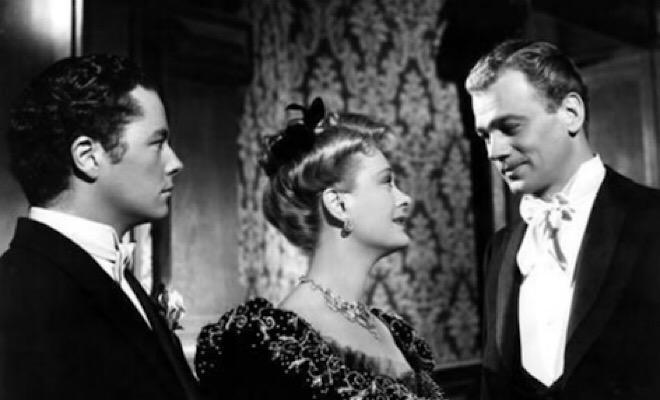
According to the liner notes, “this new digital transfer was created in 4K resolution...from a 35 mm nitrate fine-grain held by the Museum of Modern Art in New York,” and the results are often breathtaking. Marvelous clarity, contrast, and gray scale variance distinguish the 1080p/AVC MPEG-4 rendering, which also features deep blacks, crisp whites, and solid patterns. Grain is evident but never overpowering, and the texture produces a lovely film-like feel that complements the story’s nostalgic air. Palpable depth enhances many of Welles’s carefully composed and artistic shots, background elements are easy to discern, shadow delineation is quite good, and the diffused border that frames the film’s prologue exudes a beautiful ethereal quality. Most of the close-ups are intentionally soft, but they’re sharp enough to nicely highlight wrinkles, facial hair, and tears, and nary a speck or scratch sullies the pristine source material. Several cinematographers worked on The Magnificent Ambersons, but this superior transfer blends the various styles into a seamless whole. If you’re a Welles fan and you’ve been waiting for the definitive presentation of this classic film, you’ve finally got it.
Audio Review
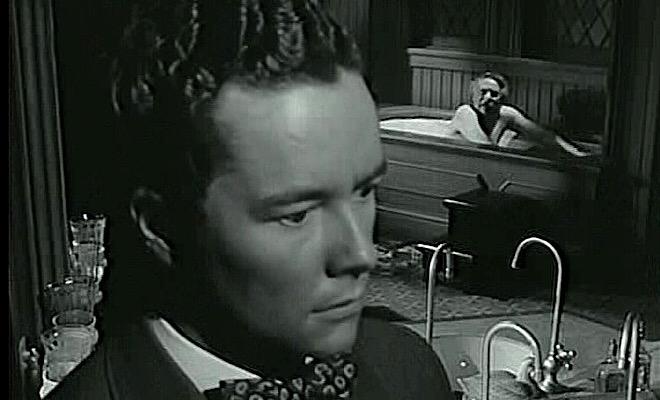
The Magnificent Ambersons is a relatively quiet film, and the LPCM mono track, which was remastered from a 35 mm print, maximizes the impact of all the aural subtleties. Welles uses sound sparingly and purposefully, and this track beautifully captures each accent and nuance. The dynamic scale is wide enough to embrace the highs and lows of Bernard Herrmann’s score while keeping distortion at bay, and all the dialogue, be it shouted in hysteria or delivered in the faintest of whispers, is clear and easy to comprehend. Best of all, any age-related hiss, pops, or crackle have been erased, so none of the dramatic silences are interrupted.
Special Features
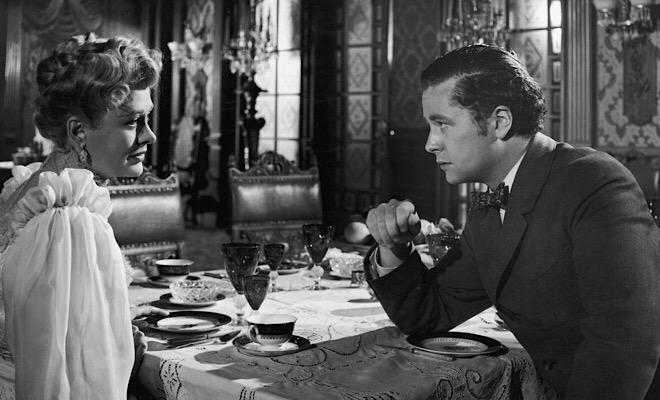
A substantial supplemental package complements this important release.
-
Audio Commentaries - Two commentary tracks are included on the disc. The first was recorded 33 years ago in 1986 by scholar Robert L. Carringer, who cites The Magnificent Ambersons as “every bit as groundbreaking technically and as important overall as Citizen Kane.” He also terms it “one of the saddest episodes in the entire history of film.” The most fascinating aspect of this discussion is Carringer’s description of the scenes that were deleted and how other sequences were almost randomly reordered after preview audiences spooked the producers. Carringer defends the editing to a certain degree, claiming something needed to be done to improve the picture, but he decries the seemingly haphazard manner those entrusted to fix the film cut and reshot scenes. (Welles was unavailable to work on the movie because he was out of the country preparing his next project.) He also sprinkles in some interesting trivia, lauds Welles’s style and attention to detail, and justifies the extravagance and effort Welles went to to achieve a desired look and mood. The second commentary was recorded in 2018 by Welles historians James Naremore and Jonathan Rosenbaum, and it focuses more on plot and style analysis. The two address the tale’s dysfunctional family angle, how the Ambersons struggle against historical trends, and the film’s objective, non-judgmental tone. They also mention how Welles was willing to edit the film to the studio’s specifications, but numerous forces conspired against him, and that the hastily added happy ending more closely resembles the ending of Tarkington’s novel than Welles’s original, more realistic coda. I didn’t find this commentary as informative or engaging as Carringer’s track, but it’s still worthwhile.
-
Featurette: “A Dangerous Nostalgia: Simon Callow on The Magnificent Ambersons” (HD, 26 minutes) - Actor and Welles biographer Simon Callow calls The Magnificent Ambersons “one of the great might-have-beens in cinematic history,” and in this absorbing 2018 featurette he discusses the various elements and personal connections that drew Welles to the story, his strange casting choices, the masterful screenplay, and how the movie was butchered following its completion. (A number of stills from several deleted scenes illustrate what was lost.) He also praises Moorehead’s performance and fervently believes Welles never recovered psychologically or professionally after his Ambersons experiences.
-
Featurette: “The Cinematographers” (HD, 16 minutes) - In this informative 2018 visual essay, Welles scholar Francois Thomas compares and contrasts the work of photographers Stanley Cortez and Harry Wild, who replaced Cortez a little more than halfway through shooting. He also points out retakes and isolated scenes shot by unidentified cinematographers following the completion of principal photography. Using studio logs and records, Thomas is able to reconstruct who filmed what, and maintains that despite the artistic differences, The Magnificent Ambersons is a “pioneering film in terms of visual style.”
-
Vintage TV Program: Orson Welles on The Dick Cavett Show (HD, 37 minutes) - On this 1970 talk show appearance (that also includes actor Jack Lemmon), Welles shares memories about his father, his personal connections to The Magnificent Ambersons (which subsequent biographers have disputed), his opinions about TV, and a number of amusing anecdotes, including one about portraying King Lear on stage in a wheelchair. He also expresses his aversion to psychoanalysis and occultism, talks a bit about Citizen Kane, and names his favorite directors.
-
Featurette: “Joseph McBride on The Magnificent Ambersons” (HD, 29 minutes) - This fascinating 2018 featurette focuses more closely on the film’s production. Welles biographer Joseph McBride chronicles in detail the picture’s post-production woes, including a disastrous preview, studio paranoia, and misguided editing and retakes. He also presents editor Robert Wise’s point of view regarding the controversial cuts, analyzes the tacked-on happy ending, addresses a damaging studio conspiracy against Welles, and reveals how Welles intended the movie to end. In addition, McBride talks about the search for the missing Ambersons footage, lauds Welles’ artistry, and tries to resuscitate the director’s reputation, praising him as “an independent filmmaker ahead of his time.”
-
Featurette: “Graceful Symmetries: Welles’s Long Version of The Magnificent Ambersons and Bernard Herrmann’s Score” (HD, 19 minutes) - Christopher Husted, a Bernard Herrmann scholar, uses a cutting continuity document to reconstruct the film and analyze the symbiosis between Welles’s drama and Herrmann’s score. Husted discusses the “pairing strategy” Welles used to contrast the drama’s various personal relationships and how Herrmann tailored his score to suit it. Deleted sections of the score help us understand the mood Welles and Herrmann strove to create and the additional drama and character development we missed. According to Husted, the cuts so enraged Herrmann, he requested his credit be removed from the film.
-
Vintage Silent Adaptation: Pampered Youth (HD, 28 minutes) - This two-reel 1925 silent adaptation of The Magnificent Ambersons severely truncates the tale, but keeps the central themes intact. It also adds an impressive fire sequence that isn’t in Welles’s film. Though the print is in pretty bad shape and there’s no musical soundtrack, this is an interesting curio. (It’s quite uncomfortable, however, to see the role of an African-American butler played by a white actor in blackface. While that might have been common practice for the time period, it is disturbing and reprehensible nonetheless.)
-
Vintage Orson Welles Audio Interviews (36 minutes) - Director Peter Bogdanovich conducted several audio interviews with Welles in the 1960s and 1970s about his films, and the lively excerpts included here cover his experiences with The Magnificent Ambersons. Welles recalls writing the script, the intensive rehearsal process, prerecording all the dialogue, and his predominant use of full shots. He also extols the writings of Booth Tarkington, talks about how the film’s depressing nature turned off audiences of the day and led to its misguided restructuring, praises Tim Holt to the hilt, and details the execution of some of the film’s most memorable scenes.
-
Audio Excerpts from AFI Welles Symposium (30 minutes) - In 1978, the American Film Institute hosted a symposium called “Working with Welles,” and in these audio excerpts, Mercury Theatre assistant Richard Wilson, sound recordist James G. Stewart, and Mercury actress Jeanette Nolan discuss Welles’s genius, his patience with and respect for actors, his work on Ambersons, the film’s complex audio challenges, and how Welles’s extensive radio experience and highly developed “aural sense” brought audio innovations to the film medium.
-
Vintage Radio Adaptations (116 minutes) - Two radio adaptations of Booth Tarkington works produced by Welles prior to his arrival in Hollywood are included. Seventeen aired on October 16, 1938 as part of CBS Radio’s The Mercury Theatre on the Air series, and Welles’s adaptation of The Magnificent Ambersons aired a year later on October 29, 1939 on The Campbell Playhouse. Interestingly, the 55-minute adaptation of Ambersons more fully develops the relationship between George and Lucy, as well as the abnormally close attachment between George and his mother. The character of Aunt Fanny is omitted, but she’s not really missed, and the roundly criticized happy ending that RKO tacked onto the film is included here, yet it somehow seems more plausible. Welles narrates the drama as the mature George and Walter Huston portrays Eugene. Unfortunately, the audio quality is quite poor, which robs this literate presentation of its quiet intensity, but it’s still well worth a listen.
-
Theatrical Trailer (HD, 2 minutes) - The film’s original preview, which includes a couple of deleted snippets, rounds out the extras package.
Final Thoughts
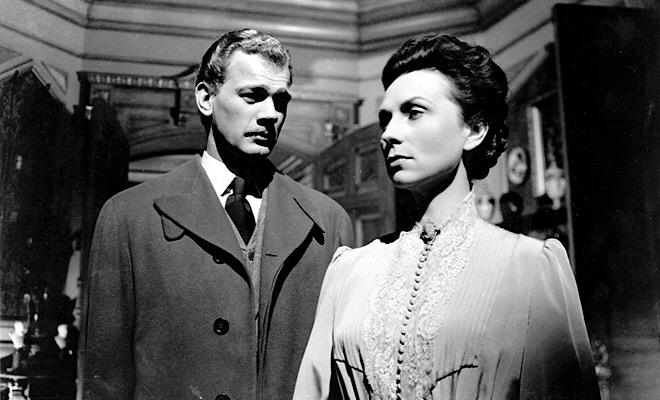
The Magnificent Ambersons is the masterpiece that almost was. Marred by studio interference and misguided editing that severely alters its tone, director/writer Orson Welles’s poetic adaptation of Booth Tarkington’s acclaimed novel stands as one of the greatest “what if” films of all time. Thankfully, though, enough of Welles’s brilliance remains to make this devastating chronicle of a wealthy family’s slow and steady decline during the Gilded Age an undisputed artistic triumph. Criterion’s sumptuous release properly salutes the troubled picture with upgraded packaging, a brand new video transfer, excellent audio, a cavalcade of absorbing supplements, and a 60-page booklet packed with noteworthy essays. Though The Magnificent Ambersons doesn’t quite achieve the magnificence Welles intended, this top-notch edition celebrates the film we have while helping us understand and envision what might have been. Highly Recommended.







